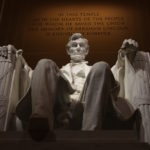This essay is part of our series on the significance of the rise of the “Nones.” See the full collection here.
What happens when a growing percentage of the population no longer identifies with any religion? What happens when the “nones” outnumber the religious? Public Discourse has explored this question in a week-long series about how the rise of the nones affects religion itself, marriage and family, politics, education, and, the topic of this essay, economics. Of course, these five pillars do not stand alone—they are intimately bound up with one another. Economic concerns don’t simply rest on matters of production and consumption. The discipline of economics is concerned with questions about equality and justice that are in turn rooted in our understanding of the nature of man and our vision of the common good. Thus, the increasing abandonment of religious affiliation will have repercussions for the economy.
Harvard University researchers Robert J. Barro and Rachel M. McCleary explored the relationship between religion and economic growth across different countries, religions, and even church-state relations. Based on their findings, they point to “causal influences from religion to economic growth, rather than the reverse.” Moreover, they believe that “higher religious beliefs stimulate growth because they help sustain aspects of individual behavior that enhance productivity.” Personal traits such as honesty, trustworthiness, work ethic, and openness to strangers are generally thought to be influenced by religion. These same characteristics also tend to be rewarded in a market economy operating within a democratic regime like the United States.
Religion plays a profound role in American culture, politics, and our economy. Alexis de Tocqueville argued:
Start your day with Public Discourse
Sign up and get our daily essays sent straight to your inbox.When any religion whatsoever has cast deep roots within a democracy, guard against shaking it; but rather preserve it carefully as the most precious inheritance . . . do not seek to tear men from their old religious opinions to substitute new ones, for fear that, in the passage from one faith to another, the soul finding itself for a moment empty of belief, the love of material enjoyments will come to spread through it and fill it entirely.
The loss of belief can be seen in the recent GSS survey results. Young people, aged 18-34, reported having “no religion” in a larger percentage than did any other age group. While it is true that young people often report less religious affiliation than older Americans, what is striking is the magnitude of the difference. In 1974, 12% of young Americans reported no affiliation while 34% reported no affiliation in 2018. Older age groups clustered around 4 or 5% in 1974 with the data fanning out over time. Twenty-five percent of the next closest group, aged 35-49, reported no religious affiliation as of 2018. Those reporting that they do not have very strong religious ties in the 18-34 year old group have actually declined from a high of 56% in 1978 to a near all-time low of 36% in 2012.
Growing consumerism—“the love of material enjoyments,” as Tocqueville described it—is one way people have tried to fill the void as they search for meaning without the framework of organized religion or religious institutions.
Elizabeth Bruenig points to the growth in the self-improvement industry as another way Americans have dealt with the loss of religion. She tells the story this way:
The preoccupation with Christian doctrine that animated the ardent pro-capitalists of yesteryear has subsided to a vaguely spiritual moralism. We now live in the age of “moral therapeutic deism,” where the shapes and colors of religion are imported into mass-market self-help schemes. Our most ardent pro-capitalists . . . don’t generally speak in terms of Christ and country any longer, but rather in modes of self-improvement and actualization.
Given the rise of the nones, the growth in consumerism, and the exclusive focus on the self, young Americans have been set adrift in a sea of their own choosing but they remain distinctly alone, isolated from the very people and institutions that could provide meaning in their own lives. This loneliness is reinforced by their beliefs about the “other.”
Data from Pew demonstrate that young Americans (aged 18-29) do not trust others. “Around three-quarters (73%) of U.S. adults under 30 believe people ‘just look out for themselves’ most of the time. A similar share (71%) say most people ‘would try to take advantage of you if they got a chance,’ and six-in-ten say most people ‘can’t be trusted.’” Furthermore, “young adults are much less likely than those 65 and older to say they have confidence in the American people to do what they can to help those in need (53% vs. 80%); work together to solve community problems (52% vs. 71%); and, treat others with respect (48% vs. 74%).”
As young Americans reject religion and lose trust in other people and institutions, their suspicion of authority figures and objective truth waxes. Yet, paradoxically, they appeal to government (or other bureaucratic authorities) the moment they believe that an injustice has occurred. This is especially true when that perceived injustice has been committed by a corporation or perpetrated by the so-called “market.” Young Americans are quick to trust in the government’s ability to solve crises of inequality or injustice. Yet they have no yardstick by which to measure what is fair or just or equal. At the same time young Americans are rejecting old forms of authority and tradition, they are reaching for—demanding, even—expanded bureaucratic programs and regulations.
According to recent research from Pew, both Millennials (70%) and Gen Z (64%) think that “government should do more to solve problems” while roughly half of Gen X and Boomers agree with this statement. Moreover, a number of other polls over the past year have shown that young adults view socialism favorably and generally regard socialism as preferable to capitalism. A Gallup poll also revealed that young Americans have a different understanding of socialism from prior generations. Traditionally, socialism meant government control of the means of production. Today, young Americans understand socialism to mean “equality” (30%) or the provision of free services and benefits like healthcare and college (13%).
Steve Chapman pointed out the irony in this turn toward government and away from the market in the Chicago Tribune:
What millennials may not realize is that many of the distinctive burdens they face are caused at least as much by government involvement as by free markets. Federal loans and grants have pushed up college tuition. Medicare inflates demand for health care. High housing costs in New York and San Francisco owe a lot to rent control and land-use restrictions.
When markets are allowed to work, they continue to generate innovations that expand options and reduce costs. Amazon, Apple, Uber, Starbucks and Walmart have made life better for consumers. Food and clothing take less of our disposable income than ever before. Cars, TVs and appliances are better and more reliable than they used to be.
So, what’s going on? Why has a belief in socialism coincided with a decline in religious belief, particularly among young Americans? And, what does this mean for a market economy?
At a time when many Americans—especially young people—no longer feel as though they can trust their family, their peers, their church, or robust civil institutions, people across the political spectrum are looking to government to fill the void. Economist Tyler Cowen predicted two policy areas where the Left and Right will likely align. First, he suggests that a new regulatory framework will be forthcoming for the technology sector. Second, he sees an expansion of pro-family policies, including “federal government action on subsidized child care, preschool programs and paid family leave, all financed by increases in budget deficits rather than higher taxes. Such policies would hand out goodies to millions of families, and appeal to women in particular.” Many conservatives have been advocating just this kind of policy agenda over the past year, including Daniel McCarthy, Rick Santorum, and others. But, where government expands, costs most often rise and private options shrink.
G.K. Chesterton may have summed up our current situation best: men who stop believing in God do not believe in nothing, but believe in anything. It seems that we’ve moved from belief in God to belief in government, and are hurtling toward an ever-growing state.















